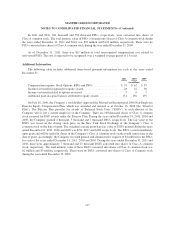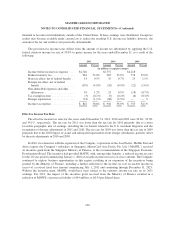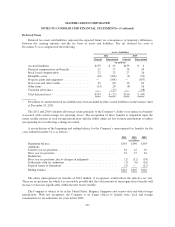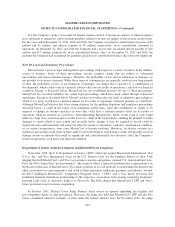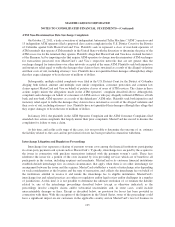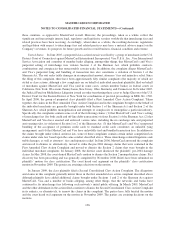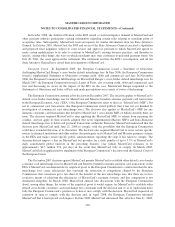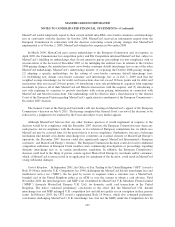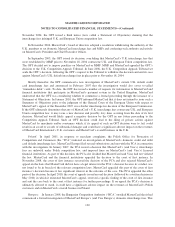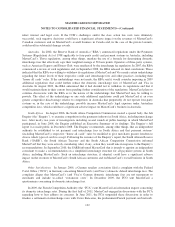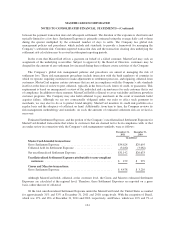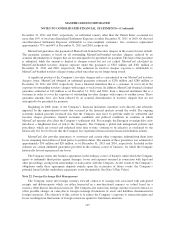MasterCard 2011 Annual Report Download - page 130
Download and view the complete annual report
Please find page 130 of the 2011 MasterCard annual report below. You can navigate through the pages in the report by either clicking on the pages listed below, or by using the keyword search tool below to find specific information within the annual report.MASTERCARD INCORPORATED
NOTES TO CONSOLIDATED FINANCIAL STATEMENTS—(Continued)
those countries, as opposed to MasterCard overall. However, the proceedings, taken as a whole, reflect the
significant and increasingly intense legal, regulatory and legislative scrutiny worldwide that interchange fees and
related practices have been receiving. Accordingly, when taken as a whole, the resulting decisions, regulations
and legislation with respect to interchange fees and related practices may have a material adverse impact on the
Company’s revenues, its prospects for future growth and its overall business, financial condition and revenue.
United States. In June 2005, a purported class action lawsuit was filed by a group of merchants in the U.S.
District Court of Connecticut against MasterCard International Incorporated, Visa U.S.A., Inc., Visa International
Service Association and a number of member banks alleging, among other things, that MasterCard’s and Visa’s
purported setting of interchange fees violates Section 1 of the Sherman Act, which prohibits contracts,
combinations and conspiracies that unreasonably restrain trade. In addition, the complaint alleges MasterCard’s
and Visa’s purported tying and bundling of transaction fees also constitutes a violation of Section 1 of the
Sherman Act. The suit seeks treble damages in an unspecified amount, attorneys’ fees and injunctive relief. Since
the filing of this complaint, there have been approximately fifty similar complaints (the majority of which are
styled as class actions, although a few complaints are on behalf of individual merchant plaintiffs) filed on behalf
of merchants against MasterCard and Visa (and in some cases, certain member banks) in federal courts in
California, New York, Wisconsin, Pennsylvania, New Jersey, Ohio, Kentucky and Connecticut. In October 2005,
the Judicial Panel on Multidistrict Litigation issued an order transferring these cases to Judge Gleeson of the U.S.
District Court for the Eastern District of New York for coordination of pre-trial proceedings in MDL No. 1720.
In April 2006, the group of purported class plaintiffs filed a First Amended Class Action Complaint. Taken
together, the claims in the First Amended Class Action Complaint and in the complaints brought on the behalf of
the individual merchants are generally brought under both Section 1 of the Sherman Act and Section 2 of the
Sherman Act, which prohibits monopolization and attempts or conspiracies to monopolize a particular industry.
Specifically, the complaints contain some or all of the following claims: (1) that MasterCard’s and Visa’s setting
of interchange fees (for both credit and off-line debit transactions) violates Section 1 of the Sherman Act; (2) that
MasterCard and Visa have enacted and enforced various rules, including the no surcharge rule and purported
anti-steering rules, in violation of Section 1 or 2 of the Sherman Act; (3) that MasterCard’s and Visa’s purported
bundling of the acceptance of premium credit cards to standard credit cards constitutes an unlawful tying
arrangement; and (4) that MasterCard and Visa have unlawfully tied and bundled transaction fees. In addition to
the claims brought under federal antitrust law, some of these complaints contain certain unfair competition law
claims under state law based upon the same conduct described above. These interchange-related litigations seek
treble damages, as well as attorneys’ fees and injunctive relief. In June 2006, MasterCard answered the complaint
and moved to dismiss or, alternatively, moved to strike the pre-2004 damage claims that were contained in the
First Amended Class Action Complaint and moved to dismiss the Section 2 claims that were brought in the
individual merchant complaints. In January 2008, the district court dismissed the plaintiffs’ pre-2004 damage
claims. In May 2008, the court denied MasterCard’s motion to dismiss the Section 2 monopolization claims. Fact
discovery has been proceeding and was generally completed by November 2008. Briefs have been submitted on
plaintiffs’ motion for class certification. The court heard oral argument on the plaintiffs’ class certification
motion in November 2009. The parties are awaiting a decision on the motion.
In January 2009, the class plaintiffs filed a Second Consolidated Class Action Complaint. The allegations
and claims in this complaint generally mirror those in the first amended class action complaint described above
although plaintiffs have added additional claims brought under Sections 1 and 2 of the Sherman Act against
MasterCard, Visa and a number of banks alleging, among other things, that the networks and banks have
continued to fix interchange fees following each network’s initial public offering. In March 2009, MasterCard
and the other defendants in the action filed a motion to dismiss the Second Consolidated Class Action Complaint
in its entirety, or alternatively, to narrow the claims in the complaint. The parties have fully briefed the motion
and the court heard oral argument on the motion in November 2009. The parties are awaiting decisions on the
motions.
126



